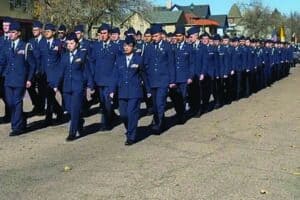Geocaching (pronounced “geo-cashing”) is kind of like a scavenger hunt; however, instead of interpreting cryptic notes, geocachers use hand-held global positioning system (GPS) receivers to find their treasure – in this case, the hidden cache.The sport of geocaching was born in May 2000, when the United States government permitted ordinary citizens (as opposed to the military only) to own receivers that communicate with global positioning satellites for the purpose of determining the receiver’s location. Hikers and backpackers started purchasing hand-held GPS units at sporting goods stores.Like a compass, a GPS receiver tells the user which way is north, south, east and west – and a whole lot more. The receivers are equipped with maps so the user can see his or her location in relation to other points of reference. Given a GPS coordinate, such as N 38∞ 56.561 W 104∞ 36.268, the GPS user can determine whether he or she is moving closer or farther from the coordinate.According to www.geocaching.com, the term “geocaching” comes from the prefix “geo” – for earth, which describes the global nature of geocaching and “cache,” a French word that refers to a temporary hiding place for various items.Typically, a geocache is a small watertight container with a “treasure” inside. The person who locates the geocache is invited to restore the item to its cache or take the item and replace it with something for the next person.The sport has evolved because of two GPS users, Mike Teague and Jeremy Irish, who founded the Web site: www.geocaching.com. Geocachers who hide a cache can enter the cache’s GPS coordinates – at no cost. The Web site also lists guidelines for placing caches on private property, such as asking the owner’s permission. Those seeking the geocaches can go to the Web site and find a list of local caches. Geocachers can use the Web site to download cache coordinates to their GPS receivers, and they can report their successes or failures.GPS receivers don’t have pinpoint accuracy, so the hider of the cache can provide a hint, which is available only when the “decrypt” link is clicked. Some purists don’t want the hints. The hider can provide other information as well: where to park, the level of difficulty with finding the cache, a map and information about the terrain.Dave Vredeveld, who lives in Peyton, has traveled as far as Okinawa, Japan, to find a cache. “I heard about it (geocaching) from a coworker,” Vredeveld said. “As usual, I jumped in with both feet, bought a GPS receiver and went geocaching.” He said he likes it because it’s an outdoor activity, and it can be competitive or relaxing. “Also, you can meet new people from around the world at geocaching events,” he said.Vredeveld’s wife, Cathy, said she would rather hide the caches than find them. “Don’t get me wrong, finding them is fun, but when you do a great job creating and hiding a tricky one, and people appreciate your work, it’s a pretty good feeling,” she said. “We’re boring as far as leaving things, I think the most interesting thing we’ve ever left has been a Japanese yen.”Cathy Vredeveld said the most interesting cache they’ve found is located in Utah. She said the name of the cache is “Dinner for Two,” and it contains a coupon or an invitation to have dinner with fellow geocachers. If the finder wants to use the coupon or invitation, he or she has to replace it with another “Dinner for Two” invitation.Cathy Vredeveld said geocaching allows her to discover new places, parks and trails that she didn’t know existed close to home.”I love the geocaching community,” she said. “We have Christmas and Halloween parties and most recently a campout. It’s also fun to participate in CITO (cache in, trash out) events, where you help clean up the local parks and pathways so others can enjoy them more.”There are 454 caches within 15 miles of Falcon and 5,074 caches in all of Colorado -enough to keep geocachers busy all summer and proof that technology doesn’t have to turn everyone into a couch potato.






